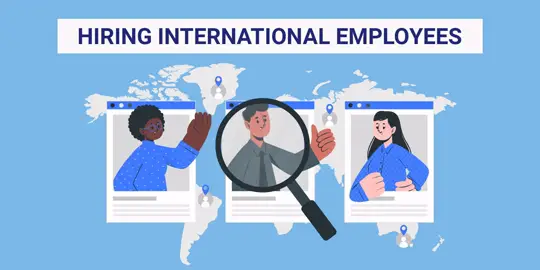Everything You Need To Know About Hiring International Employees
As remote work gains popularity, creating an international team is easier than ever. International hires can boost productivity, diversity, and sustainability. However, handling legal and logistical challenges like payroll, taxes, and compliance can be complex. Aniday’s guide addresses these issues for a seamless international hiring experience.

Hiring International Employees
Global hiring is no longer limited to large corporations. Even smaller companies can expand internationally efficiently, thanks to services like EORs and PEOs. For example, Apple's success in sourcing remote talent across borders during and after the recession allowed them to maintain market share and grow. Today, businesses of all sizes are embracing international hiring as a strategic way to start global operations and gain a competitive edge.
Why Hire International Employees?
Hiring globally is not just for big corporations like Apple. Today, businesses of all sizes can expand internationally with ease, thanks to services like EORs and PEOs. Hiring international employees offers numerous advantages, such as:
-
Access to Global Talent: When local talent is scarce, hiring internationally allows you to tap into a worldwide pool of skilled professionals.
-
Competitive Edge: Diverse teams bring fresh perspectives and innovative ideas, making your company more competitive.
-
Increased Productivity: International teams working across time zones can boost productivity, leading to quicker turnarounds and client satisfaction.
-
Market Exposure: Employing international staff helps your company understand global markets, reducing friction and building relationships with international clients.
How to go about Hiring International Employees?

Hiring international employees involves several key steps:
-
Legal Considerations: International hiring is subject to various legal and regulatory requirements. Employers must navigate immigration procedures, work visas, and compliance with labor laws. It's crucial to stay informed and ensure you're following the appropriate legal processes.
-
Work Permits and Visas: Depending on the destination country, your international employees may require work permits or visas. Understand the specific requirements and support your hires through the visa application process.
-
Cultural Integration: When hiring international employees, consider cultural integration. Provide cultural sensitivity training and resources to help them adjust to your workplace culture.
-
Tax Implications: International employees can have tax implications for both the company and the employee. Consult with tax experts to ensure compliance and minimize tax-related challenges.
-
Remote Work Arrangements: Consider whether remote work or a hybrid work model is feasible for international employees. Define clear communication and collaboration expectations to bridge geographical gaps.
Common Mistakes in Hiring International Employees
Common mistakes in hiring international employees include:
-
Insufficient Research: Failing to research the specific immigration and labor laws of the destination country can lead to costly mistakes. Each country has its own set of regulations, and not being prepared can result in legal issues.
-
Lack of Language and Cultural Training: Neglecting language and cultural training can hinder effective communication and integration. Language barriers and misunderstandings can impact productivity and morale.
-
Overlooking Visa and Work Permit Requirements: Ignoring visa and work permit requirements can result in legal violations and fines. It's essential to ensure all necessary paperwork is in order.
-
Neglecting Tax Compliance: Mishandling tax matters for international employees can lead to financial penalties for both the company and the employees. Seek expert advice on international tax implications.
-
Communication Challenges: Poor communication with international hires can lead to confusion, frustration, and disengagement. It's vital to establish clear lines of communication and regular check-ins.
Unique challenges for employers hiring internationally

Hiring internationally offers significant benefits, but it also presents unique challenges for employers. Understanding and addressing these challenges is essential for a successful international hiring process. Here are a few particular difficulties that employers could encounter:
-
Legal and Regulatory Compliance: Every nation has unique tax laws, immigration rules, and labor restrictions. Navigating these complex legal frameworks can be daunting. Employers must ensure compliance with these laws to avoid legal issues.
-
Work permits and visas: Obtaining these documents for foreign workers can take a long time and include a lot of paperwork. Countries have different requirements, therefore employers need to be aware of the particular standards and application processes.
-
Cultural Differences: Managing a diverse team with employees from different cultural backgrounds can be challenging. Effective communication and understanding of cultural nuances are crucial for fostering a harmonious work environment.
-
Language Barriers: Language differences can create communication hurdles, impacting productivity and collaboration. Employers may need to invest in language training or translation services to address this challenge.
-
Time Zones and Remote Work: International teams often span multiple time zones, which can make scheduling meetings and ensuring real-time collaboration a logistical challenge. Employers must establish clear guidelines for remote work and time zone coordination.
-
Payroll and Benefits: Managing international payroll, taxes, and benefits can be complicated due to different tax systems and benefit structures in each country. Companies often need to work with international payroll providers to ensure compliance.
-
Currency Exchange and Compensation: When paying international employees, currency exchange rates can impact their compensation. Employers must consider the financial implications and develop strategies for fair and competitive compensation.
-
Employee Retention: International employees may face personal and professional challenges when moving to a new country. Ensuring their well-being and job satisfaction is vital to retaining talent. High turnover can be costly.
-
Remote Work Technology: Providing international employees with the necessary technology and tools for remote work can be challenging, particularly if there are infrastructure disparities between countries.
-
Global Economic Factors: Economic conditions in the employee's home country and destination country can affect compensation and budget planning. Employers should stay informed about economic trends that may impact international hiring.
Tips on Hiring International Employees
Here are some essential tips for hiring international employees:
-
Plan Ahead: Start the hiring process well in advance to allow time for visa applications, relocation, and cultural adaptation.
-
Local Support: Provide assistance for housing, banking, and healthcare to help international hires transition smoothly.
-
Cultural Sensitivity: Embrace diversity and promote cultural sensitivity within your organization. Encourage all employees to learn from each other's backgrounds.
-
Effective Onboarding: Create a comprehensive onboarding program that helps international hires understand your company's culture, expectations, and policies.
-
Legal Support: Consult with legal experts who specialize in international employment to ensure compliance with local labor laws and regulations.
-
Regular Check-Ins: Maintain open and frequent communication with international employees to address any challenges or concerns promptly.
What are the visa regulations of hiring internationally?
Navigating international hiring and employee relocation involves several key aspects:
1. Residency Requirements for Relocation
To work in a foreign country, employees must meet residency criteria, which can include a minimum number of days to reside in the country each year, health checks, background checks, language tests, and more. Without meeting these standards, acquiring a work visa is not possible.
2. Getting a Work Visa When Relocating
Acquiring a work visa in a new country can be a multi-step process. The candidate may need specific qualifications, education, or skills. Some countries require a company's sponsorship to grant a visa. In certain cases, work visas are only granted if no local candidates are suitable for the role.
3. Types of Work Visas
Different countries offer various types of work visas, such as temporary, permanent, or special work visas, each with distinct requirements based on the issuing country's needs.
4. Overcoming Relocation Hurdles
Employee relocation may seem complex, but an Employer of Record (EOR) can help navigate the visa and work permit process. However, it's crucial to make international employment offers conditional on meeting the immigration and visa requirements of the destination country. Government approval is a necessary step.
How can Aniday help you with international hiring?
If you're considering international hiring, partnering with a professional organization like Aniday can streamline the process. Aniday specializes in global talent acquisition and can provide valuable assistance in several areas:
-
Immigration Expertise: Aniday can help you navigate the complex world of work permits and visas, ensuring that your international employees have the necessary documentation.
-
Cultural Training: They can provide cultural sensitivity training for your international hires, helping them integrate into your organization seamlessly.
-
Legal Compliance: Aniday can offer expert guidance on labor laws and tax compliance, ensuring that your international hiring process is legally sound.
-
Recruitment Support: They can assist in the recruitment process, identifying top international talent that matches your company's needs.
In conclusion, international hire can offer significant benefits, but it comes with its own set of challenges. It's essential to be well-prepared, legally compliant, and culturally sensitive throughout the hiring process. By following the right steps and seeking professional assistance when needed, you can successfully integrate international talent into your organization, leading to enhanced diversity, innovation, and global reach.
Aniday's HR Services
Headhunting Service
Find and recruit quality candidates in just 1 week! Supported by 40,000 experienced headhunters in IT, Finance, Marketing… capable of recruiting in any region.
Headhunting Service ➔Employer of Record (EOR) Service
On behalf of your business, we recruit employees and handle payroll without the need to establish a company in markets such as Vietnam, Singapore, Malaysia, India, Indonesia…
Employer of Record (EOR) Service ➔